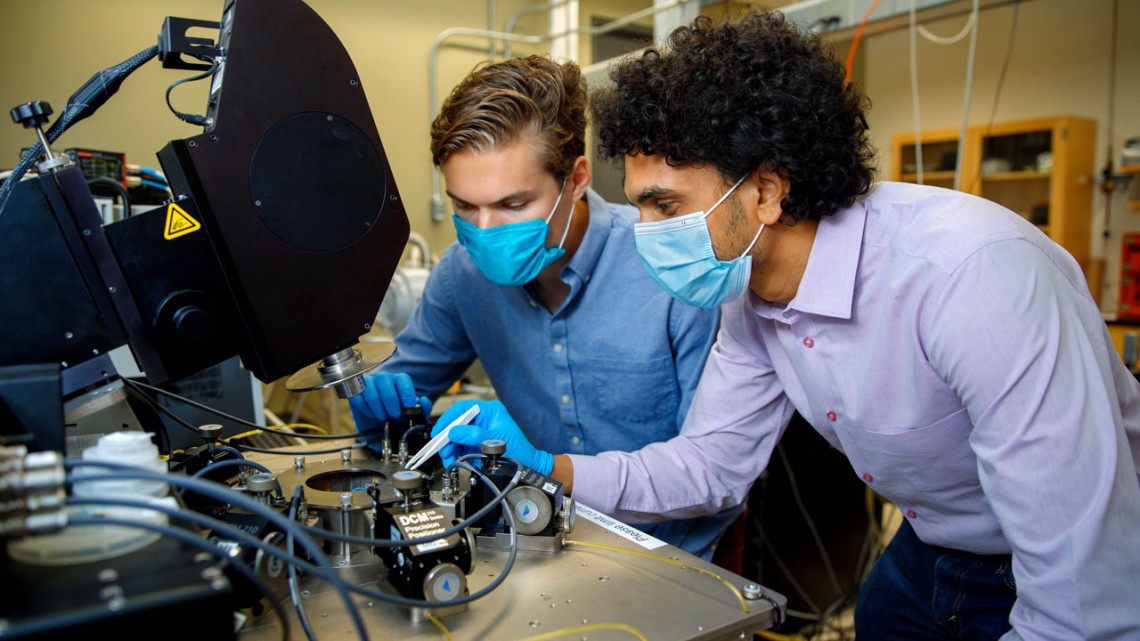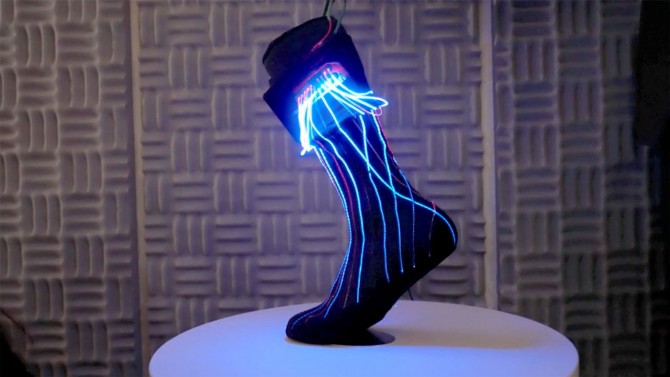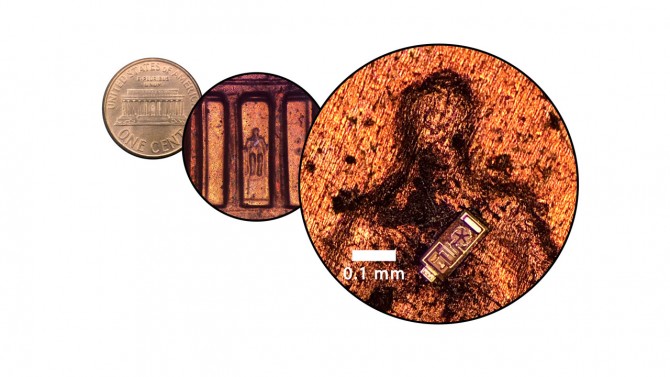
Soctera co-founders Reet Chaudhuri, M.S. ’16, right, and Austin Hickman work on their aluminum nitride-based power amplifier, which produces millimeter-wave frequency signals that can travel farther than existing technology allows.
Engineering startups harness Cornell’s entrepreneurial energy
By Casey Verderosa
Growing up in Huntington, West Virginia, Austin Hickman had always envisioned “wheeling and dealing” as a businessperson. As he gravitated toward more concrete subjects in high school, such as math and science, practicality gained the upper hand.
“But it never really left me, the thought that entrepreneurship is exciting,” he said.
Now a Ph.D. candidate in electrical and computer engineering, Hickman has been developing an aluminum nitride (AIN)-based power amplifier with the ability to produce millimeter-wave frequency signals that can travel farther than existing technology allows.
He mentioned his interest in business to his academic adviser, who suggested Cornell Engineering’s Commercialization Fellowship program.
“My entrepreneurship experience prior to the fellowship was essentially zero,” Hickman said. “That’s really when it all hit the next level. Once you start, it’s a rapid acceleration – like a rocket ship – and you just hold on.”
The commercialization fellowship is one of many resources available to engineering students in the robust entrepreneurial ecosystem the university has cultivated in recent years. Hickman’s company, along with two other startups affiliated with the College of Engineering, are taking advantage of every opportunity they can.
A trademark of the fellowship is enrollment in the National Science Foundation’s I-Corps Teams Program, which trains researchers to identify the market for their product. Cornell is one of three universities that comprise the Upstate New York I-Corps Node. It’s there that Hickman, like many other Cornell researchers, learned how to discover his customers.
He enrolled in I-Corps in 2019 and learned through the experience that his technology could be used in defense radar systems and telecommunications – especially in the global race to develop sixth-generation wireless (6G) networks.
“It can be a little overwhelming because it’s such a large space with so many competitors and established technologies that it’s a lot to wrap your head around,” Hickman said. “A year and a half ago I had no idea what the business environment surrounding 6G was like.”
In early 2020 he co-founded a company, Soctera, based on technology from his doctoral research. This has been a busy year for his startup. The company was a recipient of the College of Engineering’s annual Scale Up and Prototyping Award, which provides funding for academics whose technology may otherwise be passed up by institutional investors before their commercialization paths become clear.
The company secured membership with Launch NY, a nonprofit venture development organization serving upstate New York. It’s also receiving mentorship from the Praxis Center for Venture Development, Cornell’s on-campus incubator for startups in engineering, digital and physical sciences.
During their final year as Ph.D. students, Hickman and another Soctera’s co-founder, Reet Chaudhuri, M.S. ’16, will optimize their transistor technology and look for funding.
The allure of starting his own business also appealed to alumnus Alejandro Cortese, M.S. ’14, Ph.D. ’19. His company, OWiC Technologies, is an early-stage startup performing initial prototyping of its optical wireless integrated circuit, or OWiC.
“I always knew I wanted to build technologies that could be genuinely useful for a large group of people,” he said. “I’m interested in technology that I can envision a lot of positive applications for in my lifetime. For me, entrepreneurship made a lot of sense.”
The company is working to outfit its microscopic circuits to carry ID codes which, when a light is shone on them, would “blink out” the code; the object containing the circuit could then be uniquely identified. The technology has implications for anticounterfeiting applications, such as product authentication.
Cortese has been working on his circuits in the Cornell NanoScale Science and Technology Facility.
“It’s a magical facility,” he said. “You can build things there that would be impossible to build in 99% of universities in the U.S. – things that seem impossible until you’re looking at them through a scanning electron microscope.”
The company conducted 100 customer interviews this summer through the I-Corps Teams program, to refine the potential applications of its tech. Since its founding in November 2019, OWiC Technologies has also already patented its circuits through Cornell’s Center for Technology Licensing (CTL); received a $225,000 NSF Small Business Innovation Research award; won this year’s BenDaniel Venture Challenge, part of Big Red Ventures, Cornell’s student-run venture capital fund; joined the Praxis Center; and is being mentored through Launch NY.
“There are a ton of startups coming out of Cornell and its commercialization culture is getting better and better,” Cortese said. “It would be very hard to find another concentration of entrepreneurship resources like this in one place.”
Alice Li, CTL executive director, agrees.
“With growing support of new ventures in the ecosystem, we have seen an increase in the number of Cornell inventions used as the founding technologies for startups, which account for roughly half of the exclusive licenses these days,” she said. “With better understanding of market needs through programs such as Upstate New York I-Corps and Commercialization Fellowships, and support from incubators such as the Praxis Center and Rev: Ithaca Startup Works, student and faculty entrepreneurs are much better prepared for their endeavors with higher success rates for fundraising and product development.”
Another engineering startup, Organic Robotics Corporation (ORC), got its start out of Cornell’s Organic Robotics Lab, led by ORC co-founder Rob Shepherd, associate professor of mechanical and aerospace engineering. Founded a year and a half ago, the company has integrated its stretchable sensors, which measure touch – including pressure and stretch – into wearable garments.
“We want to supply our sensors in different markets but to gain traction we’re currently focusing on wearables for muscle fatigue,” said co-founder and CEO Ilayda Samilgil ’19. “Each sensor corresponds to a different muscle so that athletes can know when to stop engaging that muscle to prevent injury.”
In its first year, ORC joined a Rochester-based photonics accelerator, Luminate, where it also earned $100,000 in funding, and participated in the Napkin-to-Prototype Hardware Accelerator at Rev, a community business incubator co-created by Cornell, which helped get the company to the prototype stage.
This year, ORC became a member at Rev and at Launch NY, and had a booth at the Consumer Electronics Show in Las Vegas, where the team explored other applications of its tech. Shepherd and Samilgil are focusing on developing partnerships and scaling up production. They’ve also hired Cornell students and alumni as interns to address some of the company’s software, electrical and mechanical engineering needs.
The company has made some sales to a western New York startup and are subcontractors on a grant with that business and a manufacturer. “The partnership has allowed us to work with a great technology out of another startup, to continue manufacturing outside of our company, and also given us credibility in applying for more grants,” Samilgil said.
Cornell’s entrepreneurship hub has grown substantially over the last decade. Faculty, alumni and any entrepreneur looking to operate in New York’s Southern Tier region can find plenty of opportunities to strengthen their business using Cornell resources.
“Learning how many entrepreneurial resources Cornell offers and how interconnected they are has been really eye-opening,” Hickman said. “It’s clear that the university wants entrepreneurship to happen and it’s a really good time to get in because they want you to succeed.”
Casey Verderosa is a writer for the Center for Regional Economic Advancement at Cornell University.
Media Contact
Get Cornell news delivered right to your inbox.
Subscribe



